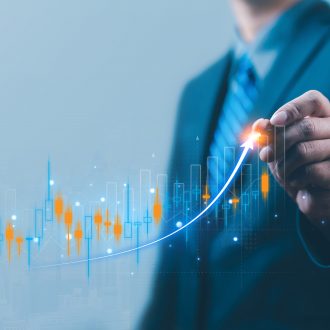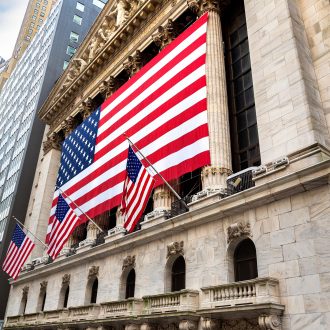
In the last issue of Worth Considering, I shared my view that perhaps the sun was setting on the longstanding market leadership of the “Mag 7” stocks. I also pointed out that it is a natural and welcome development. The MAG 7 May Not Be the MAG(A) 7… And That’s Just Fine
But I want to reiterate that this rotation can be noisy and perhaps confusing as it unfolds. That’s why I’ve title this essay “The Pain of Change”. Change is typically good, but rarely pleasant. I think this thought fits the current day markets and news reports pretty well.
In recent years, along with the strong growth of those Mag 7 stocks came their outsized contribution to the most popular indexes we follow in the investment world. This is because most indexes are ‘market cap’ weighted which means stocks like Apple, Microsoft, and Nvidia – the top 3 components of the S&P – mean much more to the daily movements of the index than the likes of Caesars, Celanese, and FMC – the bottom 3 components. (www.financhle.com)
The result of a top-heavy index like this is that it can distort the bigger picture. Just as in recent years when the vast majority of stocks were languishing, the strength of the biggest names made the indexes look healthier than perhaps they really were. The opposite can now be said. The indexes may be looking weaker than the underlying story because the big names are pulling back while money is rotating to the names lower on the list. Again, history tells us this is a very good development. But, as you can see from simple math, any stress in the bigger names is going to skew the full picture of what’s happening to most stocks in the market.
This natural internal market activity is now coinciding with some rather unnatural world events. President Trump and his team are wasting no time trying to fulfil campaign promises and there is a feeling of alarm in many corners that there could be a ‘ready, fire, aim’ approach being taken. As I’ve stated time and again, I am not politically driven and my responsibility for being an advocate for my clients’ goals would render any political persuasion irrelevant anyway, so any comment on political issues is solely in the context of how they impact markets. And political noise does indeed impact markets, but typically only for short periods of time. In other words, the speculation about any political tactic, like tariffs currently, moves markets dramatically in the short term while they ultimately mean very little to the longer-term market direction. Remember, too, that we have reason to believe that the ultimate level of tariffs will be meaningfully lower than the publicly discussed starting points. This means the impact of tariffs, while negative in my view, won’t be at the everyday-impact level to throw US economic growth, or growth of our trade partners, into negative territory.
Loose translation: Volatility, almost certainly. Bear market, very unlikely.
With respect to market volatility, we live in a fast-paced world. Thirty-plus years ago, when I started in this business, corrections in markets took much longer to play out. News, or what passes as news, wasn’t disseminated instantaneously. Knee-jerk reactions were nowhere as severe as they are in the modern day. The 24-hour for-profit media outlets, an internet that puts information at people’s fingertips, active imaginations, and our human emotions geared for fight or flight responses, all add up to volatility of different kinds. There is financial market volatility and there is human emotional volatility.
In times like these, it’s good to remember how quickly the next news cycle will come. Headlines change at breakneck speed. Today’s euphoric news could be next week’s despair, and vice versa. And if you were to put your investments through that same ringer, it’s only logical that you’d be much worse for the wear.
Also try to remember that market volatility isn’t a bug within the system, rather, it is a feature of the system. When markets dip, experience corrections, whipsaw, or whatever term is chosen to explain the temporary stress we all endure as investors, keep in mind that long term success requires these seasons of anxiety. If we try to wish them away, we’re being foolish. It is exactly this up and down nature of markets that, ironically, keeps them healthy and provides for our eventual profits.
That is, of course, if you maintain proper perspective. And I won’t pretend this is always easy. To that end, below is one of my favorite cartoons that summarizes the investing experience perfectly. Simply put, some days can feel really bad as an investor. However, when you look back at all the world has gone through on the way to your portfolio growing over time, you reap the rewards you’ve earned.
With respect to this current spate of turbulence in the markets, I would suspect it will last a little longer. While there are quantitative factors like valuations, degrees of drawdowns, and money flows to help judge when things stabilize, there are also far less intellectual inputs to look for. Personally, I always feel confident that market stress is about to subside when the financial channels start airing Special Reports. When these folks start nightly sessions with subtitles like “markets in panic” or anything that lets them use the phrase “meltdown”, for example, that triggers my inner Warren Buffett instinct to be a little greedy when others are fearful. It’s also worth noting that markets have an average dip of roughly 13% within each and every year. The noise of the current day hasn’t led to that type of dip yet. So, to me, it’s logical that we still have some additional strain in the markets ahead. But let me be clear, I don’t think this is a severe thunderstorm brewing. Instead, I see this as a very noisy and understandably nerve-wracking shower that will pass in due course and leave things healthy after it has gone by.
As much as I’d love to say I know when the tide turns, I don’t. Nobody does and obviously be very skeptical of anyone suggesting they do. Also be aware that the financial media will be putting hyperbole in overdrive. I have a friend who long ago told me he thinks Madison Avenue, where the advertising firms tend to be located, has done more harm to investors and average Americans than Wall Street ever has. His view is that the advertising industry and the way it plays a role in hyper-emotionalizing everything has led to more costly myopia than we realize. I’m no fan of Wall Street, per se, but I see his point when it comes to the damage that can result from the sensationalistic approach to modern advertising. The financial media has to sell commercials too, so they have taken an ever-increasing approach to drama, which is exactly what investors don’t need!
If you are feeling any heightened degree of anxiety about your portfolio’s ability to reach the goals we’ve mapped out, please give us a call right away. Our tagline here at Winn Partners is “Stability in Motion”. That doesn’t mean markets won’t be unstable from time to time, but it speaks to our purpose of keeping our clients on an even keel emotionally and their portfolios on track to reach their ultimate goals regardless of market fluctuation. So please reach out if there’s anything you’d like to dig into more deeply.
The Takeaways:
- The tariffs the President wants to impose will have a negative impact on the economy. But not as large as most fear and highly unlikely to be large enough to lead to a recession.
- The current market dip seems orderly and may be masking a more healthy rotation of capital away from just the Mag 7 stocks. This broadening out of the market is great for future growth even if it masks the virtues of that shift due to the ‘market cap’ weighted nature of the indexes.
- Please understand that market volatility simply comes with the territory. Nothing about the current volatility suggests that anything within the greater system is broken.
- I do expect this period of uncertainty to last a while longer, meaning the markets are likely to be subdued for a while, too. This isn’t an indication that the investment outlook for the quarters and years ahead is different for me. It isn’t. I continue to expect a period of a pause that will be followed by a resumption of an uptrend.
Disclosure
Securities offered through International Assets Advisory, LLC (“IAA”) – Member FINRA/SIPC. Advisory services offered through International Assets Investment Management, LLC (“IAIM”) or Global Assets Advisory LLC (“GAA”) – SEC Registered Investment Advisor(s). IAA, IAIM, and GAA are affiliated entities.
The information provided is based on carefully selected sources, believed to be reliable, but whose accuracy or completeness cannot be guaranteed. Any opinion herein reflects our judgment at this date and is subject to change without notice. This should not be construed as an offer or solicitation to buy or sell securities. This information is not intended to be legal or tax advice. Please consult a tax, legal, or financial professional with questions.
Investors should consider the investment objective, risks, and charges and expenses before investing. Different types of investments involve varying degrees of risk, and there can be no assurance that any specific investment will be either suitable or profitable for a client or prospective client’s wealth management investment portfolio. Past performance is not an indication of future performance. International Assets Advisory, LLC and its affiliates, employees and/or directors may have positions in these securities, and may as principal or agent, buy from or sell to customers. All securities are subject to price and yield change and subject to availability. Investments in securities and insurance products are: NOT FDIC-INSURED/NOT BANK-GUARANTEED/MAY LOSE VALUE. Stocks, options, and mutual funds are subject to market volatility and may lose value. Mutual funds, Unit Investment Trusts and Variable Annuities are sold by prospectus only. Please read the prospectus carefully for important information about fees and risk considerations. Bonds are subject to changes in interest rates, risks of defaults by issuer, and the loss of purchasing power due to inflation, or the risk that an issuer will be unable to make interest or principal payments. Additionally, bonds and short-term investments entail greater inflation risk than stocks. Any fixed-income security sold or redeemed prior to maturity may be subject to a substantial gain or loss. Investing in securities underlying in currencies other than the U.S. dollar involves certain considerations comprising both risk and opportunity not typically associated with investing in U.S. securities. The security may be affected either favorably or unfavorably by fluctuation in the relative rates of exchange between currencies, by exchange control regulations, or by indigenous economic and political developments.



